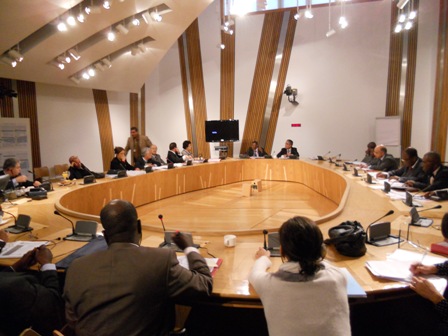EDINBURGH: CCDH PRESIDENT PRESENTS NANHRIs’ MAJOR IMPACTS, CHALLENGES AND NEXT STEPTS IN ICC BUREAU MEETING
Being President of the Network of African National Human Rights Institutions (NANHRIs), Mr. Ahmed Herzenni, President of the Advisory Council on Human Rights (CCDH), presented the major impacts, challenges and next steps of the Network in the meeting of the Bureau of the International Coordinating Committee of National Human Rights Institutions (ICC), held on October 7th, 2010 , in Edinburgh, Scotland.Mr. Herzenni indicated that the Advisory Council on Human Rights was elected to the presidency of the Network at the conclusion of the 7th Conference of African National Human Rights Institutions, held in Rabat from November 3 to November 5, 2009. This conference was an opportunity for the Network to re-examine its activities and determine its priorities.

Mr. Herzenni stated that a plan of action for 2010-2011 was drawn up, in collaboration with NANHRI Secretariat, to “provide the Network with the necessary tools to create effective and efficient missions and to play an active role with the principal regional and international partners, notably the ICC, and to empower the African National Human Rights Institutions (ANHRI) both individually and as a group, to influence policies concerning Human Rights”.
To this end, he confirmed, we first need to improve NANHRI operations, strengthen capabilities of national human rights institutions, consolidate cooperation and interaction with international and regional organizations, in particular the ICC, the United Nations, the African Union, the African Commission on Human and People’s Rights, NHRI regional networks and other institutions and organizations concerned, formulate a communication strategy for the Network, develop a strategy for fund raising and set up working groups each corresponding to one of the following themes: economic social and cultural rights, education and training in Human Rights, transitional justice, children’s rights, the rule of law, those who are displaced, refugees or stateless, and the fight against corruption.
Mr. Herzenni indicated that some NHRIs operate in a socio-political environment hostile to human rights. This does not allow these institutions to carry out their mandate in accordance with the Paris Principles. The founding documents of other NHRIs do not guarantee any independence and let the door open to all kinds of threats including interference by the Executive in the running of national commissions, which results in loss of their credibility, Mr. Herzenni said. But we are working to solve this problem, he added.
Several workshops and trainings were organized to strengthen the capabilities of African NHRIs, to wit: a sub-regional workshop on human rights for the representatives of Eastern and Southern African national human rights institutions, held in Uganda, from May 24 to May 28, 2010, and a regional training in human rights for representatives of African NHRIs, held in Rwanda from June 22 to July 1, 2010. Other workshops were organized to restart and reinforce collaboration between African national human rights organizations and the African Commission on Human and People’s Rights, the African Court for Human and People’s Rights, the African Committee of Experts on the Rights and Welfare of the Child and ECOWAS Court of Justice…
The presidency of the African Network of National Human Rights Institutions will organize the first meeting of Truth Commissions and African National Human Rights Institutions in December 2010 in Togo. The theme of this meeting will be devoted to “interaction between ANHRIs and Truth Commissions in the transitional justice process”. A partnership convention will be concluded between the Network and the Association for the Prevention of Torture (APT) to implement a common plan of action. This convention will aim particularly to promote measures against torture in Africa and reinforce the role of African national human rights institutions in this area.
The ICC Bureau held this meeting on the occasion of the 10th International Conference of National Human Rights Institutions on “Business and Human Rights: the role of NHRIs”, held from 8 to 10 October 2010, in Edinburg, Scotland. This conference shed lights on the “State duty to protect” against corporate human rights violations, corporate responsibility to respect human rights and access to a remedy for human rights violations.






















